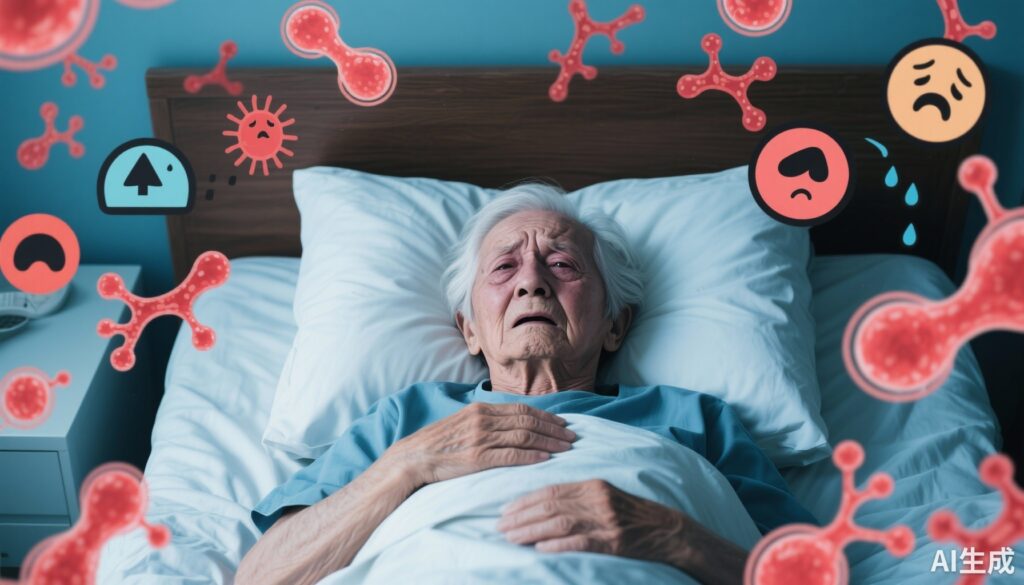Highlight
- Older adults with insomnia demonstrate an exaggerated depressive mood response when exposed to inflammatory challenge compared to those without insomnia.
- Exposure to endotoxin increased depressed mood and depressive symptoms significantly more in the insomnia group, despite similar inflammatory cytokine increases in both groups.
- Inflammatory response correlates with mood worsening only in older adults with insomnia, implying a unique vulnerability profile.
- Results suggest the need for vigilant depression monitoring and targeted prevention strategies addressing both insomnia and inflammation in older populations.
Study background and disease burden
Insomnia and systemic inflammation are common among older adults and contribute significantly to their overall disease burden. Both insomnia and elevated inflammatory activity represent important risk factors for the development of late-life depression, a condition associated with substantial morbidity, impaired quality of life, and increased healthcare utilization. The biological mechanisms linking insomnia to depression are complex and multifactorial; however, inflammation is hypothesized as a critical pathway mediating this association. Prior observational studies have suggested that older adults with insomnia may have amplified inflammatory activity and depressive symptoms, but causal relationships remain to be established. Understanding whether inflammatory challenges provoke greater depressive mood responses specifically in older adults with insomnia is therefore essential to advancing preventive and therapeutic strategies tailored to this high-risk group.
Study design
This was an assessor-blinded, parallel-group randomized clinical trial conducted at a single center in Los Angeles, California, from August 2017 to November 2022. The study enrolled 160 community-dwelling, nondepressed adults aged 60 years or older, stratified into two groups based on insomnia disorder status: 53 participants with insomnia and 107 controls without insomnia. Participants were randomized within their insomnia status groups to receive either an inflammatory biological challenge via endotoxin administration or placebo. The primary outcome was depressed mood measured by the Profiles of Mood States depression subscale (POMS-D), with secondary outcomes including observer-rated depressive symptom severity and plasma inflammatory cytokine levels. Data analysis was completed between July 2023 and August 2024.
Key findings
Among the 160 randomized participants (mean age 65.9 years; 52.5% female), 79 were assigned to endotoxin (26 with insomnia, 53 controls) and 81 to placebo (27 with insomnia, 54 controls). All participants completed the protocol, ensuring robust follow-up data. Endotoxin administration induced statistically significant and clinically meaningful increases in depressed mood (POMS-D) compared to placebo across the cohort. Critically, those with insomnia exhibited significantly greater increases in self-reported and observer-rated POMS-D scores relative to controls (condition × group interaction, F10,1478 = 4.7, P < .001 for self-report; F3,450 = 5.5, P = .001 for observer ratings), demonstrating an exaggerated mood response to inflammation.
Similarly, observer-rated depressive symptom measures revealed clinically relevant elevations in the insomnia group after endotoxin exposure. Importantly, inflammatory cytokine levels (including key markers such as IL-6 and TNF-α) rose comparably in both insomnia and non-insomnia groups following endotoxin administration, showing that differential mood responses were not due to differences in systemic inflammatory activation alone.
Moderation analysis further confirmed that the magnitude of the inflammatory response was positively associated with increases in depressed mood exclusively in the insomnia group (β = 0.33; 95% CI, 0.26-0.41; P < .001), whereas no such relationship was observed in controls. These findings underscore that insomnia moderates the impact of inflammatory challenge on depressive symptoms, likely reflecting enhanced neurobiological sensitivity or altered inflammatory signaling pathways in affected individuals.
Safety outcomes were favorable, with endotoxin well tolerated and no significant adverse events reported, supporting its viability for experimental inflammatory provocation in this population.
Expert Commentary
This pivotal trial establishes, with high methodological rigor, a causal link between inflammation and acute depressive symptom exacerbation preferentially in older adults with insomnia disorder. It advances previous correlational findings by utilizing an experimental endotoxin model to dissect vulnerability features intrinsic to insomnia that amplify mood responsivity to peripheral inflammation. The dissociation between similar systemic cytokine elevations and differential mood responses suggests that central inflammatory mechanisms or neuroimmune interactions might be uniquely sensitized in this subgroup. Clinically, these results resonate with the broader literature recognizing insomnia as a potent modifiable risk factor for depression and highlight inflammation as a potential therapeutic target.
Limitations include enrollment of a relatively healthy, community-based sample that may limit generalizability to medically complex older adults or those with established depression. Further research is warranted to elucidate neural pathways mediating this effect, longitudinal impact of recurrent inflammatory insults, and to test combined insomnia-inflammation interventions for depression prevention.
Conclusion
In summary, this randomized clinical trial reveals that older adults with insomnia disorder exhibit exaggerated depressive moods and symptoms following inflammatory challenge despite equivalent cytokine responses, highlighting a synergistic vulnerability nexus between sleep disturbance and inflammation in late-life depression pathogenesis. These findings support implementation of vigilant depression monitoring during inflammatory stressors in this population and call for integrated prevention strategies targeting both insomnia and inflammation to mitigate the risk of late-life depression. As the global population ages, such tailored approaches become increasingly critical to improving mental health outcomes and reducing the societal burden of geriatric depression.
References
Irwin MR, Boyle CC, Cho JH, Piber D, Sadeghi N, Castillo D, Smith MT, Eisenberger NI, Olmstead R. Inflammatory Exposure and Depression in Older Adults With Insomnia: A Randomized Clinical Trial. JAMA Psychiatry. 2025 Sep 1;82(9):859-867. doi: 10.1001/jamapsychiatry.2025.1327. PMID: 40668551; PMCID: PMC12268530.
Additional relevant literature:
1. Irwin MR. Why sleep is important for health: a psychoneuroimmunology perspective. Annu Rev Psychol. 2015;66:143-172.
2. Dowlati Y, Herrmann N, Swardfager W, et al. A meta-analysis of cytokines in major depression. Biol Psychiatry. 2010;67(5):446-457.
3. Vgontzas AN, Zoumakis E, Bixler EO, et al. Chronic inflammation and sleep in aging and dementia. Ann N Y Acad Sci. 2010;1193:113-119.



